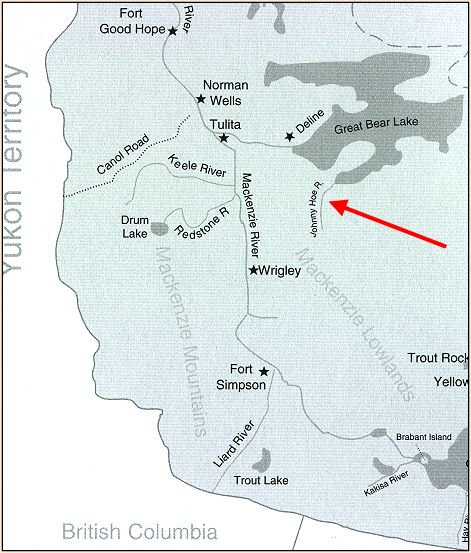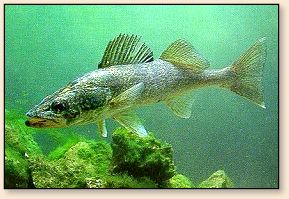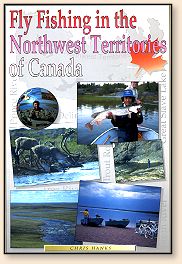|
Years ago, on northern Manitoba's Hayes River,
I occasionally took small walleye on a fly rod
with a yellow sally jig. My results were never
consistent was I was simply dabbling around creek
mouths in the spring. Back then, if I really
wanted fish I broke out the spinning rod. At
Johnny Hoe I was determined to take walleye on
a fly rod. Perhaps it was not an accident that
I waited to make the big push until I was on world
class water with first rate walleye fishermen for
whom fish forestalled freeze-dried rations. What
I learned is that any good streamer fisherman who
is willing work bottom structures from 5 to 20 feet
down has a shot. Your casting will not always be
elegant as your turn over a heavy sinking line with
a pair of weighted streamers, but the rig is effective.
The best flies at Johnny Hoe look amazingly like
small jigs.

Although two- to found-pound walleye would have been
a gas on my 6 weight rod, I resorted to a nine-1/2
foot, 8 weight that throws a nice open loop in
deference to the heft of the flies.
Walleye are carnivores with a capital C. They prey
almost exclusively on small fish. The list of
potential prey cited by Scott and Crossman in
Freshwater Fishes of Canada is nearly
encyclopedic in length. If it is smaller than the
walleye and swims, it is food. Knowing this, I went
armed with weighted streamers that matched the
indigenous nine spine stickleback, flat headed
sculpin and smelt or herring. These were backed
up by a variety of attractor patterns. In the end,
it was imitations of local bait fish based on the
Clouser minnow pattern that were the most effective.
 Despite my success, walleye are not a natural fly rod
fish. Unlike northern pike which will readily strike
near the surface, the walleye normally must be dredged
up from the deep. Given the choice of catching a couple
of walleye in the morning, or a boat load of northern
pike, there is no choice, walleye make a better shore
lunch.
Despite my success, walleye are not a natural fly rod
fish. Unlike northern pike which will readily strike
near the surface, the walleye normally must be dredged
up from the deep. Given the choice of catching a couple
of walleye in the morning, or a boat load of northern
pike, there is no choice, walleye make a better shore
lunch.
In most of North American, fly rodding for walleye
is not high on many peoples'list as warm water
temperatures drive the fish down shortly after
they spawn. In the Mackenzie River drainage of
the western NWT, however, there is a window of
opportunity in late spring and early summer when
the fish are within the range of the streamer
fisherman. Since I fished the Johnny Hoe, I have
made it my business to seek out other fly rod
walleye opportunities that are easier to access.
The key is to stalk them in a riverine situation
before they drop back into a lake and go deep.

The Johnny Hoe River can be difficult to hit right.
By the time the ice clears in Great Bear Lake and
the lodges open later in July, it is really too late
for the Johnny Hoe. One northern lodge owner, quipped
at me as I prepared this manuscript, "Don't mention
Johnny Hoe. It is simply too far away." In a real
sense he is right, there are other superb walleye
holes that are not overfished and easier to access.
Flying out of Hay River, Yellowknife and Fort Simpson
there are great opportunities. Trout Lake Lodge and
Deegahni Lake Camp, south of Great Slave Lake are, for
instance, fly-in operations that open in early June
on superb water at a fine time for the streamer
fisherman looking for walleye. If you can catch
the walleye on the bug, then someday there is
Johnny Hoe. ~ Chris Hanks
Credits: From Fly Fishing in the Northwest Territories of Canada,
By Chris Hanks, Published by Frank Amato Publications.
We appreciate use permission!
|



